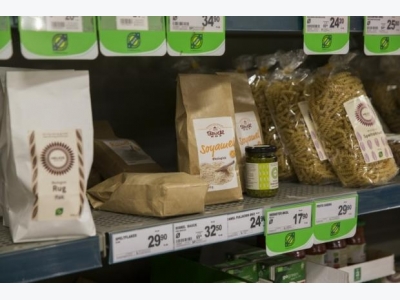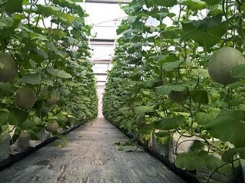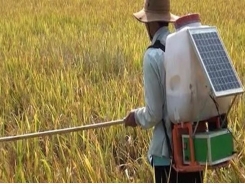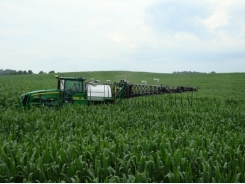How sustainable is organic food?

Organic food seems like it should be good for the environment. But not all Norwegian researchers agree it is sustainable.
Can a production system be sustainable if it relies on a consumption pattern that is not sustainable? asks Arne Grønlund, senior researcher at NIBIO, the Norwegian Institute of Bioeconomy Research. (Photo: Berit Roald, NTB scanpix)
The Norwegian government has decided it will have a bigger say in what Norwegians eat. By 2020, lawmakers have decided, 15 per cent of all food grown in the country should be produced using organic methods.
Meeting that goal will require organic food production in Norway to jump from just 3 per cent of all food produced now by volume to 15 per cent in just four years.
The Norwegian Association of Natural Scientists (Naturviterne), a trade union, recently organized a breakfast seminar on sustainability and organic food production.
Unsurprisingly, the researchers who attended disagreed over whether or not organic food production in Norway is actually sustainable.
Organic food is romanticized
Arne Grønlund, senior scientist at the Norwegian Institute of Bioeconomy Research (NIBIO), believes that the romantic view of organic food production as something natural is simply wrong.
“This perception gives the consumer a false impression. Organic food production appears to be natural, and consumers see as positive,” he says. “But what the consumer doesn’t think about is that agriculture is in no way natural. Food produced using agricultural means is not produced in harmony with nature, whether it is grown by organic or conventional methods.”
Strict regulations, better animal welfare
Organic food production is governed by strict regulations. Organic food can only be produced using manure and other organic fertilizers, among other requirements. Mineral fertilizers, also called chemical fertilizers, are not allowed, nor are chemical pesticides.
In addition, organic animal husbandry is governed by strict regulations governing animal conditions and welfare, including a requirement that animals should spend as much time as possible outdoors.
The politicians who enacted the requirement to increase organic food production believe that it will lead to more environmentally friendly agriculture, better use of local, renewable resources, increased recycling of nutrients and better animal welfare.
But the bottom line is, is organic food production sustainable? Can it feed the world’s population over several generations, while still protecting the environment? With respect to these questions, the scientific community is both uncertain and in disagreement.
Organic farming as a spearhead
Sissel Hansen, senior scientist at the Norwegian Centre for Organic Agriculture (NORSØK), explains that organic farming should act as a spearhead for environmentally sustainable farming in Norway.
“Due to limitations on the use of purchased fertilizers and chemical pesticides, a organic farmer has to find new solutions and methods to succeed with their operation. These are often solutions that conventional agriculture can learn from,” Hansen says.
“Often, the farmers in the lead are the innovators. Only afterwards is there research to check what they have done to see if the method can be recommended for wide use,” she said.
She says organic farmers have already pioneered techniques that are now commonly used in conventional agriculture, such as the use of geotextiles to protect vegetables from carrot flies and cabbage moths.
“It’s about good agronomy, first and foremost,” she says.
Hansen believes that organic farming can contribute to a sustainable society, but also that society has to think sustainably, too.
For example, she says, people must throw away less food. One Norwegian environmental group, “Framtid i våre hender” (the Future is in our hands) has calculated that 361,000 tons of edible food are tossed out each year in Norway.
This amount could feed nearly one-fifth of Norway’s population, and is equivalent to the greenhouse gas emissions from 375,000 cars, Hansen says.
Fertilizer and farmland
Arne Grønlund from NIBIO says that increasing the production of organic food in Norway to 15 per cent will not be sustainable.
He says the biggest constraint on organic food production is the absolute prohibition on chemical fertilizers. He believes this is inadequately justified, and that increased reliance on organic farming will result in a negative soil nutrient balance, smaller crops and increased space requirements.
Grønlund says that most agree that sustainable food consumption means that people eat more vegetables, less meat, and waste less food.
“If we do this, there will be fewer animals and (consequently) less organic fertilizer. Can a production system be sustainable if it relies on a consumption pattern that is not sustainable?” Grønlund asks.
NORSØK’s Hansen says organic producers are well aware of this problem, and that research is underway to look for better ways to use and recycle nutrients. One approach being investigated is to recycle phosphorus from human urine, she said.
Related news
Tools

Phối trộn thức ăn chăn nuôi

Pha dung dịch thủy canh

Định mức cho tôm ăn

Phối trộn phân bón NPK

Xác định tỷ lệ tôm sống

Chuyển đổi đơn vị phân bón

Xác định công suất sục khí

Chuyển đổi đơn vị tôm

Tính diện tích nhà kính

Tính thể tích ao




 Bio-refineries could reduce imports of environmentally harmful soy
Bio-refineries could reduce imports of environmentally harmful soy  Why do farmers use fertilizers?
Why do farmers use fertilizers?